
Who eats Cheerios?
Shinobu the chinchilla.
I watch on Facebook.
Author: Hyperscapes
A Very Brief History of CAA (2003-2013)
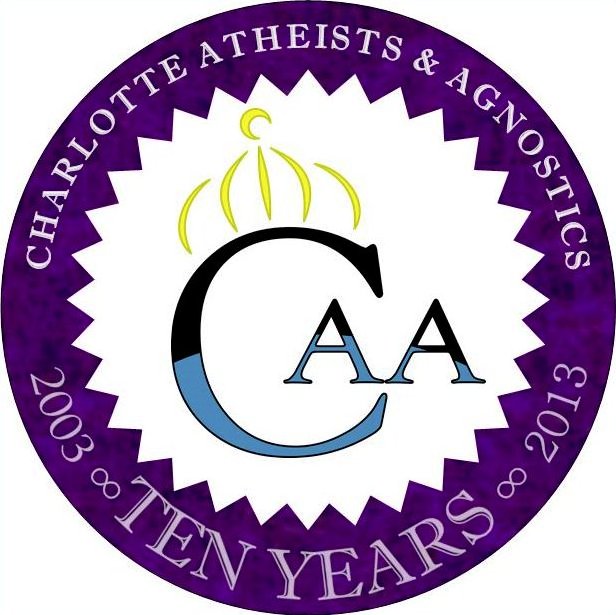
The following was written in 2013 as a result of the 10th anniversary of the Charlotte Atheists & Agnostics (CAA). It serves as an example of how one secular group began and evolved a little differently than most groups of its kind.
The ‘official’ birth of ‘Charlotte Atheists & Agnostics’ (CAA) can be traced back to January 2003 when an email distribution list at YahooGroups was created for the few atheists who had previously been meeting once every 3 months or so through MeetUp.com.
In the summer of 2005, the group became affiliated with American Atheists. Later, it would also become affiliated with the American Humanist Association and Atheist Alliance International (now, Atheist Alliance America).
In January 2007, Dan Russell-Pinson built the first website and forum for the group, and he became the official group organizer.
During those first several years, meetings were occasional and purely social.
Meetings were held at places like: Hartigan’s Irish Pub, Applebees, Outback Steakhouse, and the Mellow Mushroom.
The meetings usually topped out at around 10 people.
As the group began to grow, people inevitably envisioned different directions for what CAA should be: some wanted a purely social outlet, some wanted more formalized activism, and so on.
In March 2009, to avoid fragmentation, CAA enacted bylaws and elected its first officers.
Dan Russell-Pinson became the first president….
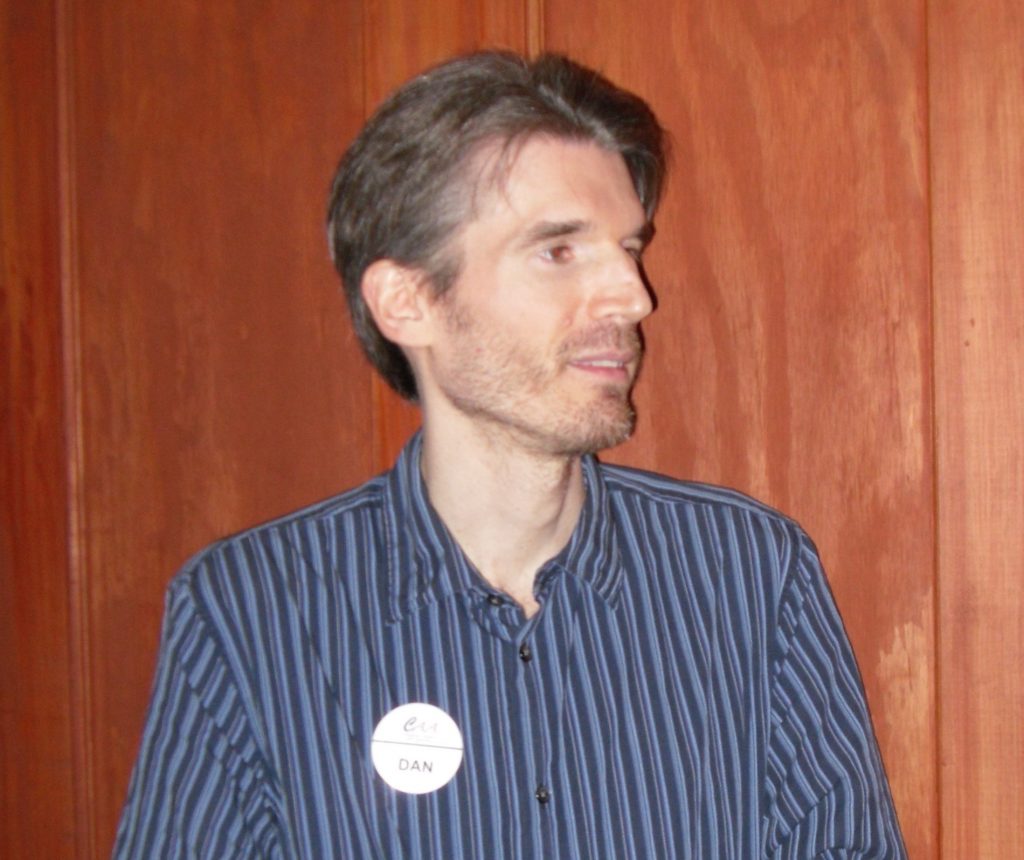
A mission statement was approved…
“To create and foster a close-knit community of non-believers and to put a positive face on atheism through education, public outreach and community service.”
The group had grown to such an extent by then that it had to find a new place to meet. It found a “home” of sorts at Dilworth Neighborhood Grille, where members could take over the room in the back or the space downstairs.
CAA decided not to make any changes regarding the purely social aspect of the now monthly socials, but started holding separate “planning” meetings each month.
When some wanted to start having speakers, CAA made that a separate event as well–and so on with any other activities–until the calendar was filling up each month with many different types of CAA events.
There were monthly community service projects, charity drives, movie nights, and book club meetings, and there was now an annual Garden of Eatin’ picnic added to the calendar….
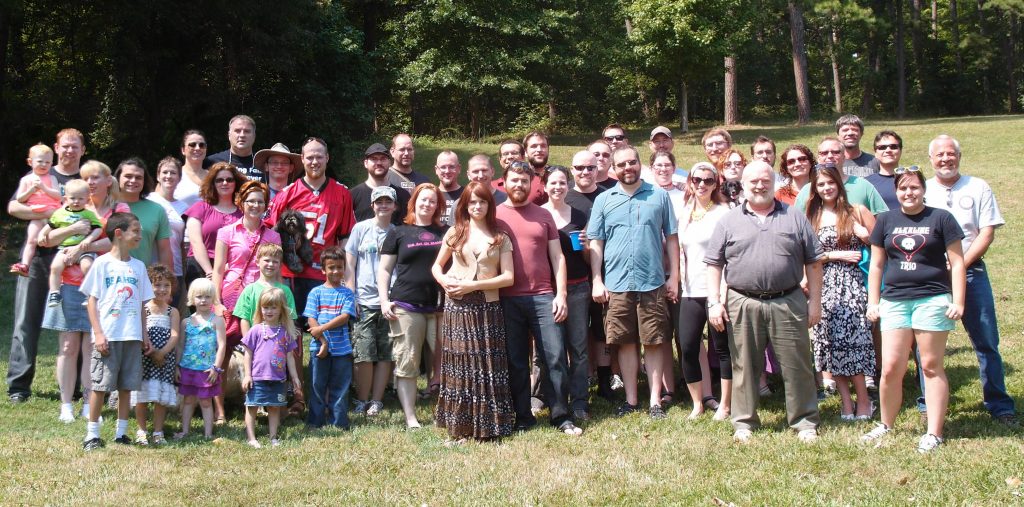
While Dan was president, he was interviewed on radio, television, and for “Charlotte” magazine…
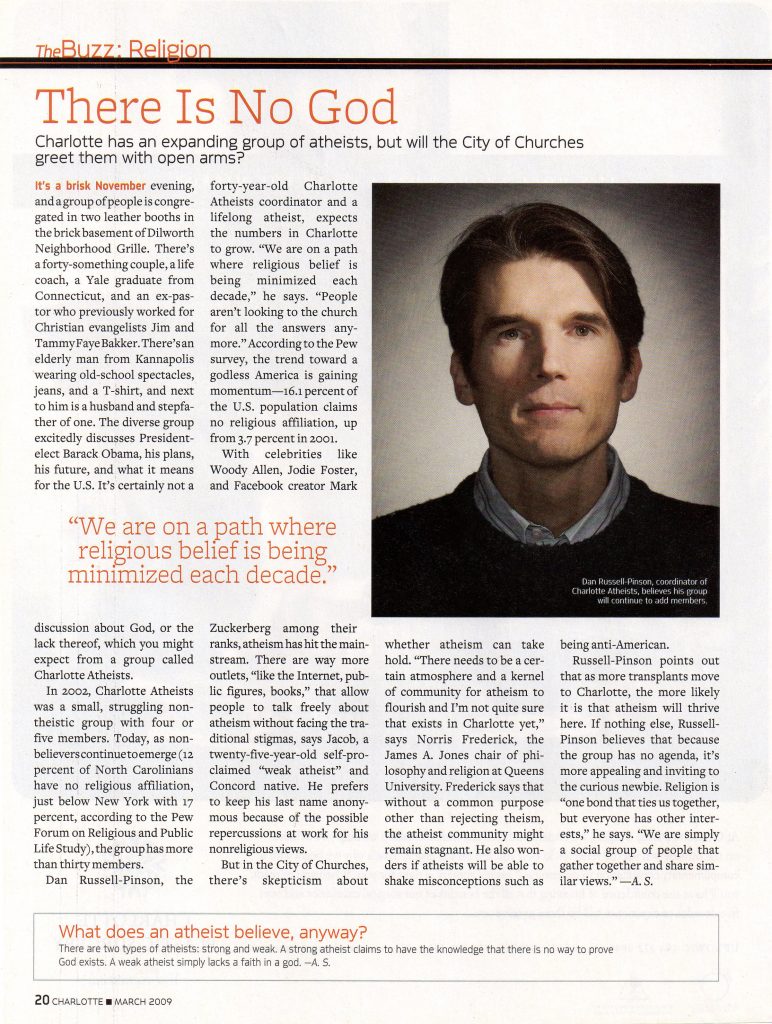
A new website and forum were built, and the groundwork was laid for CAA’s participation in the statewide “One Nation Indivisible” billboard campaign in 2010.
In the spring of 2010, Dan passed off the torch to Mike Tooney, who became the second president of CAA.
That summer, CAA received several rounds of media attention—local, national, and international–from its involvement with the “One Nation Indivisible” billboard campaign. CAA member William Warren was the media representative for the billboard in Charlotte.
Over 300 new members joined the new CAA website as a result of the campaign, bringing the total to over 1,300, and the following monthly social drew a record 75-80 people.
In the spring of 2011, Shawn Murphy became the third CAA president with Mary Snow as VP.
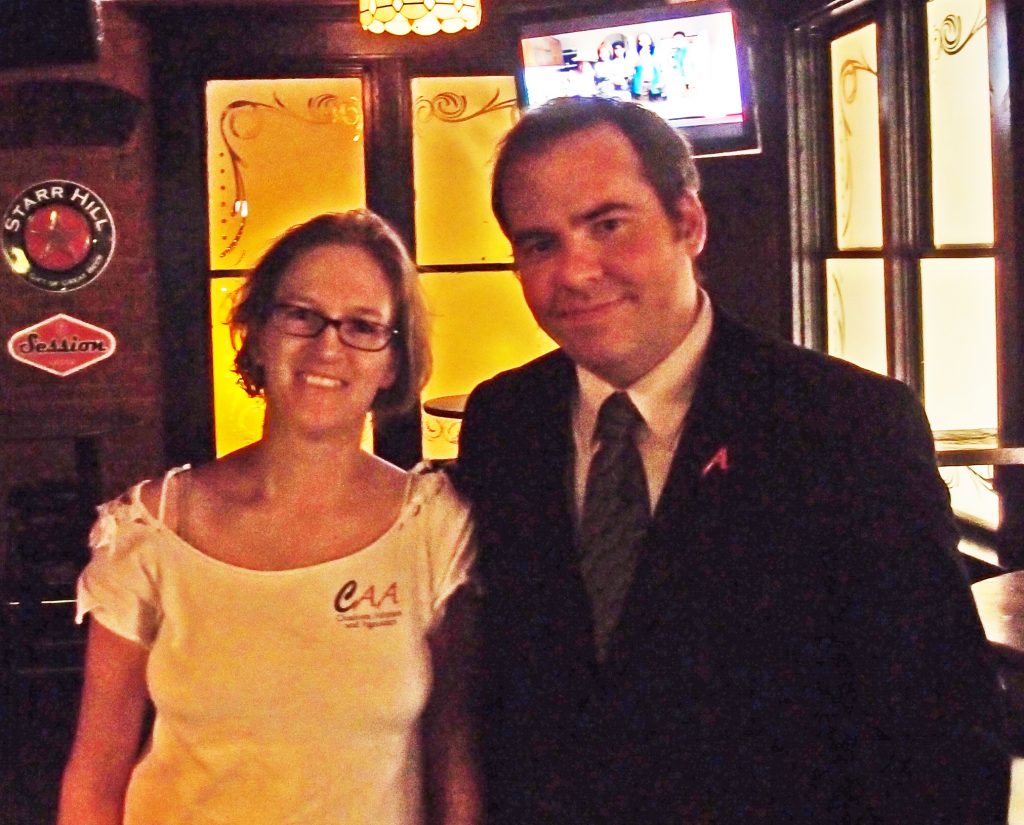
Monthly steering committee meetings began, monthly “alternative” socials were tested, and annual Darwin Day brunches and annual fundraising Summer Soirees were added to the calendar.
A youth group was launched, more speakers were brought in, a group page was started on Facebook, and CAA adopted a street in downtown Charlotte to keep clean….
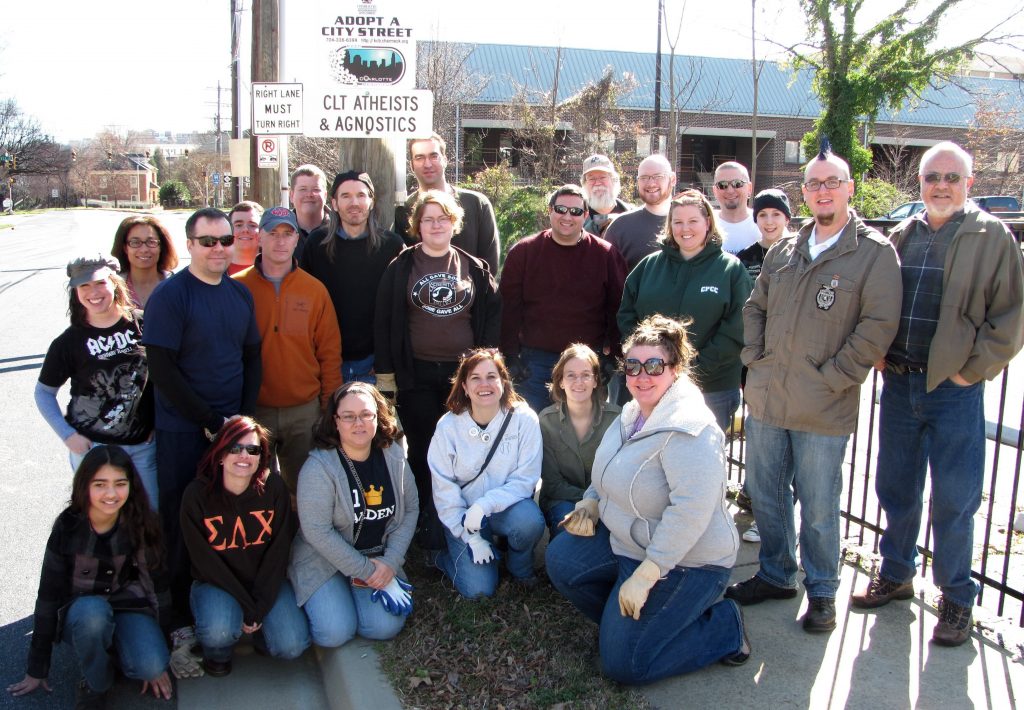
President Shawn Murphy was interviewed on radio and television, and participated at interfaith events….
In 2012, several CAA members attended the Reason Rally in DC and Rock Beyond Belief in Fayetteville, NC.
Later, CAA representatives spoke out in the “Free Speech Zone” at the Democratic National Convention and received some media attention as a result.
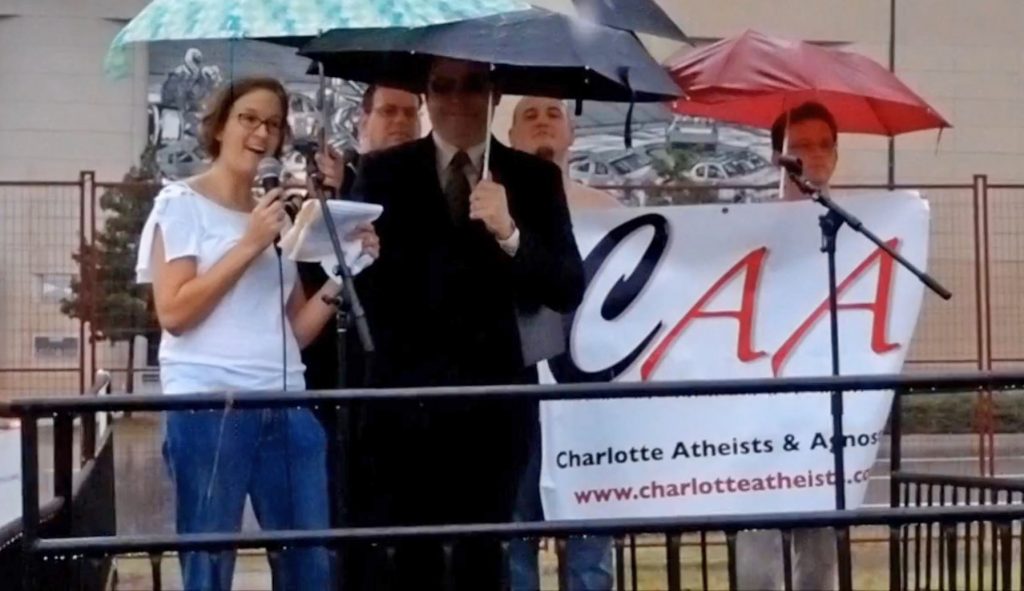
CAA’s original logo, seen in the picture above, was replaced with a new one….
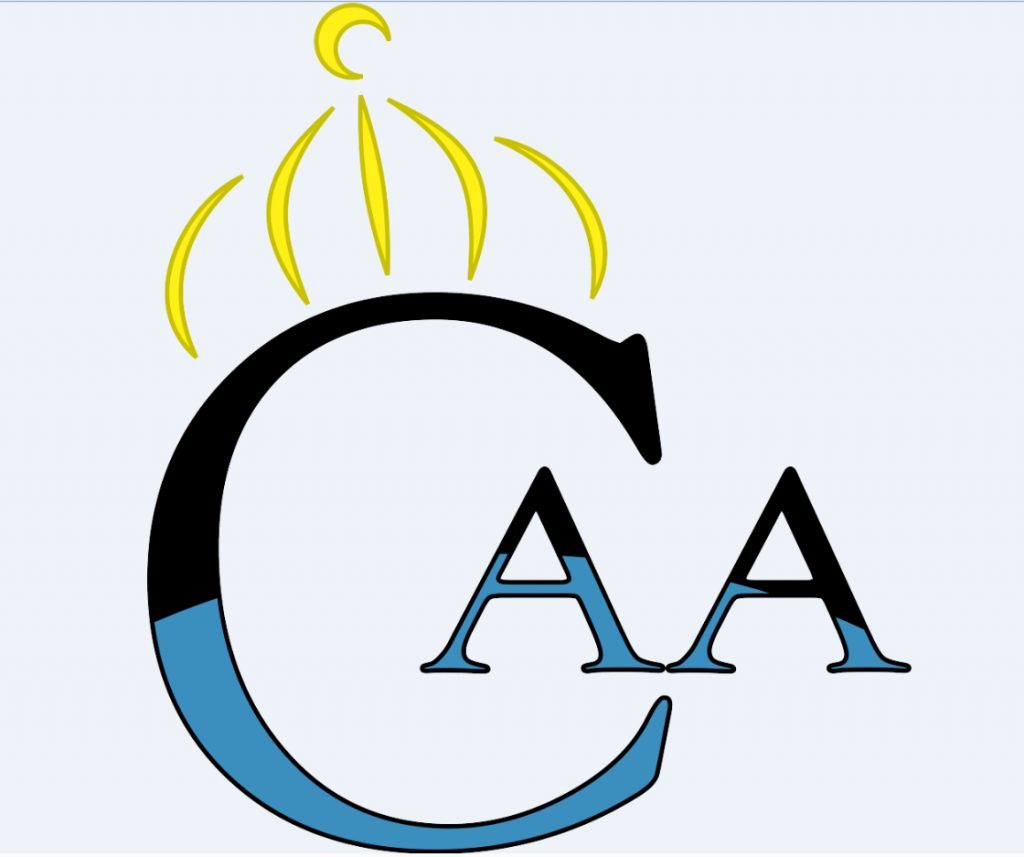
CAA became affiliated with the Carolinas Secular Association, and later went on to help sponsor and host two of that organization’s conferences held in Charlotte.
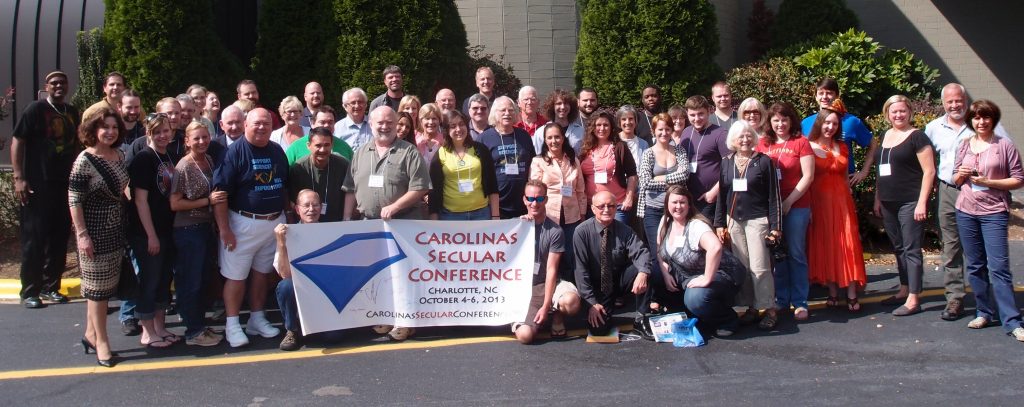
CAA also became an endorsing organization of the Secular Coalition for America and later joined the Charlotte Coalition of Reason (Charlotte CoR).
For two years running, CAA was able to get former Charlotte Mayor Anthony Foxx to sign proclamations proclaiming a “Day of Reason” for Charlotte…
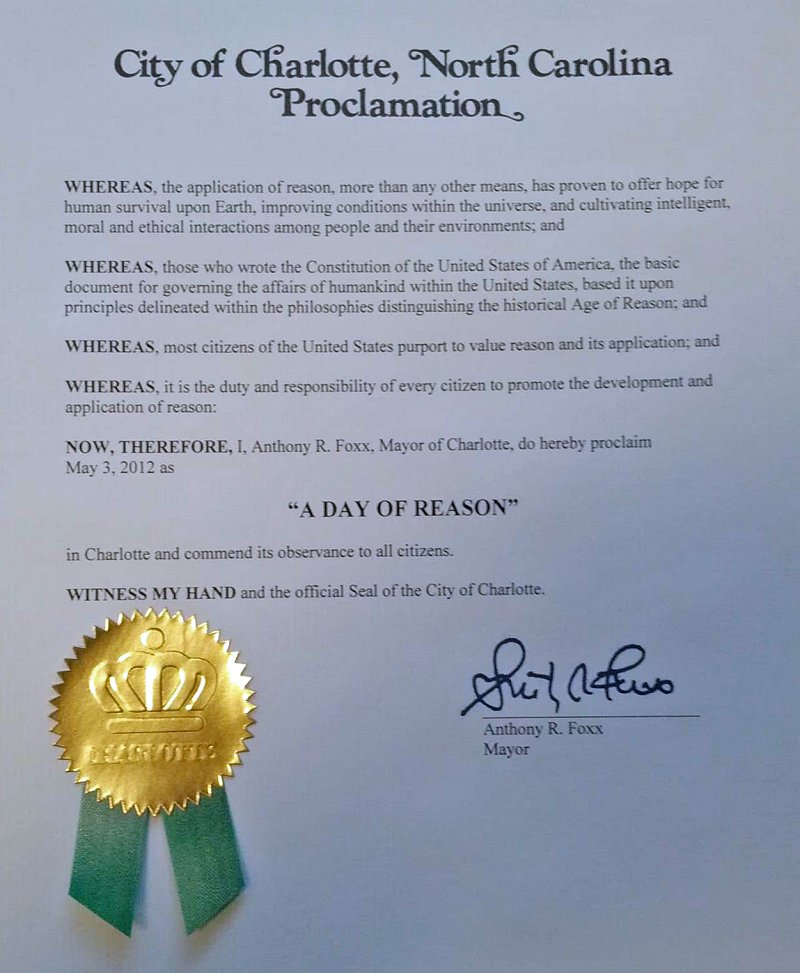
This resulted in more media attention when Foxx was appointed Transportation Secretary for the Obama Administration shortly after he signed the second one….
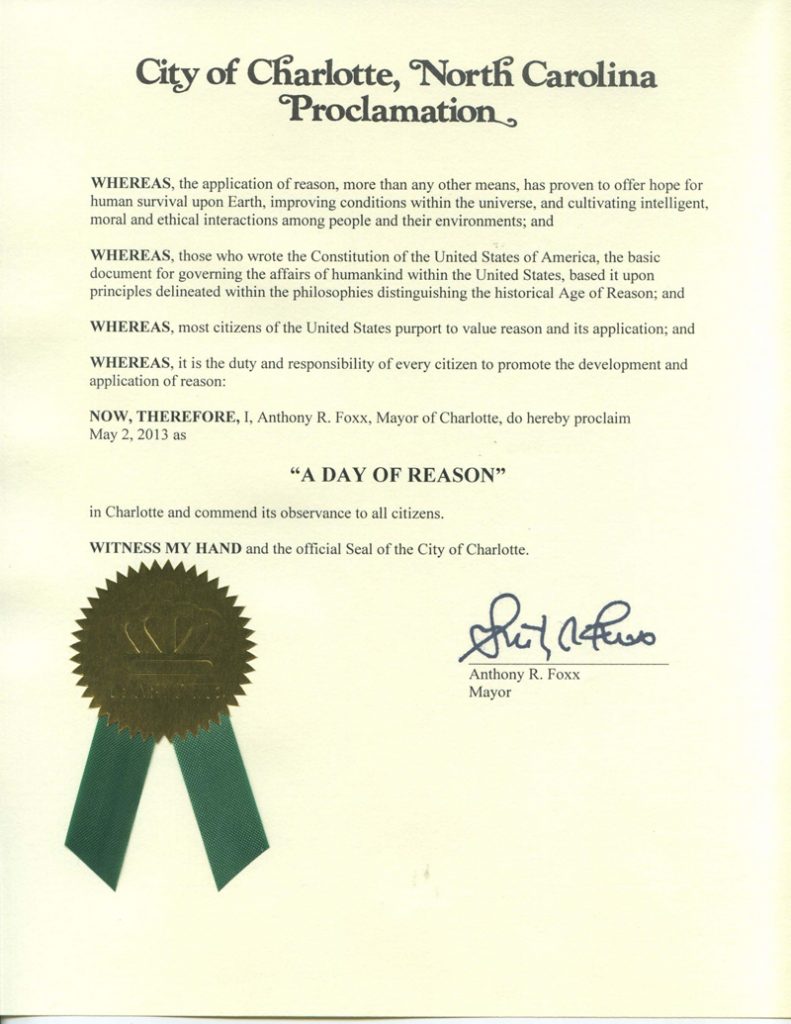
In 10 years, CAA went from not being able to gather five people together more frequently than quarterly to a thriving group with over 1,300 registered members on the website.
In the summer of 2013, CAA celebrated its 10 Year Anniversary with a dinner banquet at Dilworth Neighborhood Grille…
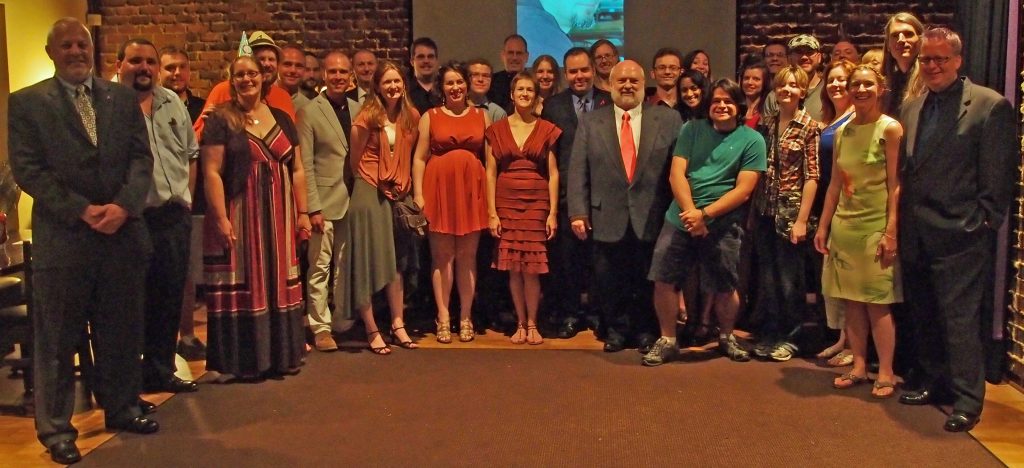
Trump’s Assessment of Himself (Selected Quotes)
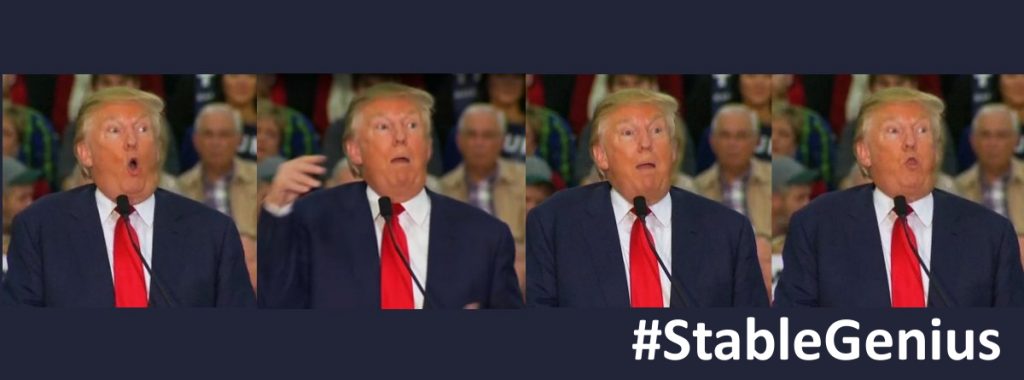 LIKE A SMART PERSON
LIKE A SMART PERSON
“You know, I’m, like, a smart person.” “I am a really smart guy.” “I’ve been known as being a very smart guy for a long time.” “I have a very good brain and I’ve said a lot of things.” “I’m intelligent. Some people would say I’m very, very, very intelligent.” “And then people say oh, is he a smart person? I’m smarter than all of them put together, but they can’t admit it.” “My IQ is one of the highest — and you all know it! Please don’t feel so stupid or insecure; it’s not your fault.” “My two greatest assets have been mental stability and being, like, really smart…. I went from VERY successful businessman, to top T.V. Star, to President of the United States (on my first try). I think that would qualify as not smart, but genius….and a very stable genius at that!”
A GREAT ATHLETE
“I was the best baseball player in New York when I was young.” “I always knew I was good. I was always good at it. I was the best athlete.” “I was always the best athlete, people don’t know that.” “I’ve won many club championships and I was always the best athlete.” “Always the best player. Not only baseball, but every other sport too.” “I was good at wrestling. I was really good at football. I was always good at sports. I was always the best at sports.” “I had it [innate ability]. I always had it.” “I like being a great athlete.”
ATTRACTIVE
“My fingers are long and beautiful, as, it has been well documented, are various other parts of my body.” “All of the women on The Apprentice flirted with me – consciously or unconsciously. That’s to be expected.” “I’m so good looking.” “I feel like a supermodel except, like, times 10, OK? It’s true. I’m a supermodel.” “Do I look a president? How handsome am I, right? How handsome?”
RICH AND SUCCESSFUL
“The beauty of me is that I’m very rich.” “I have made myself very rich.” “I was always the best at what I did.” “I don’t think I’ve made mistakes.” “Everything I’ve done virtually has been a tremendous success.” “I was successful, successful, successful.” “I’m the most successful person ever to run for the presidency, by far. Nobody’s ever been more successful than me.” “I’ve been, you know, pretty successful in the courts over the years, I’ve been a very successful person, you can check — USA Today said, ‘he does great in the courts’ OK?” “If you don’t tell people about your success, they probably won’t know about it.”
A NICE PERSON WITH GREAT TEMPERAMENT
“I had some beautiful pictures taken in which I had a big smile on my face. I looked happy, I looked content, I looked like a very nice person, which in theory I am.” “I think I am a nice person.” “I’m actually a nice person.” “I have a strong temperament.” “I think I have a great temperament.” “I have a great temperament. My temperament is very good, very calm.” “I think I’m a sober person… I’m a very sober person.”
RAN A FLAWLESS CAMPAIGN
“I’ve had a beautiful, I’ve had a flawless campaign.” “I won an election that should never be won, because the Electoral College is far harder to win than the popular vote. The popular vote, for me, would have been much easier.”
MOST RESPECTFUL OF WOMEN AND ‘THE BLACKS’
“I have more respect for women by far than Hillary Clinton has.” “Nobody respects women more than me.” “I was the one that really broke the glass ceiling on behalf of women more than anybody in the construction industry.” “There’s nobody who has done more for equality than I have.” “Number one, I am the least anti-Semitic person that you’ve ever seen in your entire life. Number two, racism, the least racist person.” “I am the least racist person that you have ever met.” “I am the least racist person that you’ve ever encountered.” “I am the least racist person, the least racist person that you’ve ever seen, the least.” “I have a great relationship with the blacks.” “I have a great relationship with African Americans, as you possibly have heard. I just have great respect for them. And they like me. I like them.” “And did you know my name is in more black songs than any other name in hip-hop? Black entertainers love Donald Trump.” “And at the end of four years, I guarantee you, that I will get over ninety-five percent of the African-American vote. I promise you.”
MULTI-TALENTED & KNOWLEDGEABLE
“I build the best buildings.” “Nobody builds walls better than me.” “I created maybe the greatest brand.” “Trump Steaks are the world’s greatest steaks.” “I have the best [golf] courses in the world.” “My Twitter has become so powerful that I can actually make my enemies tell the truth.” “I know all about knives and belt buckles.” “And I know more about wedges than any human being that’s ever lived.” “I know more about [campaign] contributions than anybody.” “Nobody has better toys than I do.” “Nobody loves the Bible better than I do.” “I’m the king of debt. I understand debt better than probably anybody.” “Nobody knows more about debt than I do.” “I think nobody knows more about taxes than I do, maybe in the history of the world. Nobody knows more about taxes.” “Nobody knows more about taxes than I do — and income than I do.” “I know the details of taxes better than anybody. Better than the greatest C.P.A.” “Nobody even understands it but me. It’s called devaluation.” “Nobody knows more about trade than me.” “I’m really a great negotiator. I know how to negotiate.” “Deals are my art form. I like making deals, preferably big deals.” “Nobody knows banking better than I do” “I understand money better than anybody.” “I know the details of health care better than most, better than most.” “I know more about the big bills than any president that’s ever been in office.” “I know the H1B. I know the H2B. Nobody knows it better than me.” “I know the best people.” “I know the smartest negotiators in the world. I know the good ones. I know the bad ones. I know the overrated ones.” “I’m really good at war.” “I know more about ISIS than the generals do. Believe me.” “Nobody would be tougher on ISIS than Donald Trump.” “Nobody is bigger or better at the military than I am.” “I know more about offense and defense than they will ever understand.” “There’s nobody that understands the horror of nuclear better than me.” “Nobody is fighting for the veterans like I’m fighting for the veterans.” “Nobody’s better to people with disabilities than me.” “There’s nobody more pro-Israel than I am.” “Nobody knows jobs like I do!” “Nobody knows politicians better than I do.” “Nobody knows the game better than I do.” “Nobody knows the system better than me, which is why I alone can fix it.” “Nobody in the history of this country has ever known so much about infrastructure as Donald Trump.” “I know more about renewables than any human being on Earth.” “Nobody’s ever had crowds like [I’ve] had.” “Nobody can do it like me. Nobody. Nobody can do it like me, honestly.” “Nobody is stronger than me.” “It’s all because of me.” “I know words. I have the best words.”
MODEST
“I think I am actually humble. I think I’m much more humble than you would understand.”
– Donald Trump
[NOTE: I didn’t exhaust all the quotes I could have included, but many of them were repetitive.]
Happy Holidays!
 I hope everyone has a very merry Zagmuk, Sacaea, Saturnalia, Yuletide, Sankranti, Brumalia, Dies Natalis Solis Invicti, Hanukkah, Alban Arthuan, Midwinter, Finn’s Day, Festival of Sol, Festival of the New Sun, Festival of Growth, Great Day of the Cauldron, Dong Zhi, Nollaig, Juul, Jul, Jiueis, Jol, Joulu, Joulupukki, Children’s Day, Festival of Kronos, Kallikantzaroi, Karkantzaroi, Dazh Boh, Chaomos, Inti Raymi, Soyal, Sada, Touji, Geol, Feailly Geul, Modra-niht, Giuli, Iol, J–lm^nu_r, Shass Greiney Geuree, Yn Ad-Gheurey, Divalia, Larentalia, Sigillaria, Midvinterblot, Touji, if Inti Raymi, Shabe-Yalda, Sviatki, Koleda, Choimus, Soyalangwul, Diwali, Sadeh, Adur-Jashan, Maidyarem, Shab e Cheleh, Novo Hel, Nollaig, Pongal, Modranetc, Yalda Night, Karachun, St. Thomas’ Day, Christmas (Xmas), The Festival of the Long Night, Wintervil, Zamenhof Day, Festivus, HumanLight, Chrismukkah, Giftmas, Newtonmas, Kwanzaa, Boxing Day, Lenaea (Festival of the Wild Women).
I hope everyone has a very merry Zagmuk, Sacaea, Saturnalia, Yuletide, Sankranti, Brumalia, Dies Natalis Solis Invicti, Hanukkah, Alban Arthuan, Midwinter, Finn’s Day, Festival of Sol, Festival of the New Sun, Festival of Growth, Great Day of the Cauldron, Dong Zhi, Nollaig, Juul, Jul, Jiueis, Jol, Joulu, Joulupukki, Children’s Day, Festival of Kronos, Kallikantzaroi, Karkantzaroi, Dazh Boh, Chaomos, Inti Raymi, Soyal, Sada, Touji, Geol, Feailly Geul, Modra-niht, Giuli, Iol, J–lm^nu_r, Shass Greiney Geuree, Yn Ad-Gheurey, Divalia, Larentalia, Sigillaria, Midvinterblot, Touji, if Inti Raymi, Shabe-Yalda, Sviatki, Koleda, Choimus, Soyalangwul, Diwali, Sadeh, Adur-Jashan, Maidyarem, Shab e Cheleh, Novo Hel, Nollaig, Pongal, Modranetc, Yalda Night, Karachun, St. Thomas’ Day, Christmas (Xmas), The Festival of the Long Night, Wintervil, Zamenhof Day, Festivus, HumanLight, Chrismukkah, Giftmas, Newtonmas, Kwanzaa, Boxing Day, Lenaea (Festival of the Wild Women).
And a very happy birthday to Adonia, Appolo, Attis, Baal, Dionysus, Helios, Hercules, Mithra, Osiris, Perseus, Theseus, Jesus, and King Arthur.
Story of the Upside-Down Xmas Tree
In 1979, I was lying in bed and wondered why people didn’t decorate their ceilings. I began to decorate mine with billowing Indian print bedspreads or tapestries and other things.
In the 1980s, I first had the idea to hang an upside-down Xmas tree from the ceiling, but I didn’t act on it.
In 1998, a co-worker offered me her old artificial tree, and I implemented the idea. I put it up with strings, wire, and push-pins. I strung lights, decorated it, and put presents all around.

In 1999, I put a toy train around it and decorated the whole ceiling as if it were Xmas morning, and some of the gifts had been opened. I had a chess game in progress, a spilled drink,a Twister game, and various other gifts laying around.



I moved to a new place in 2001 and set it up again on the ceiling of my porch less elaborately.

I thought it was a unique idea, but a friend sent me a picture of an upside-down tree in a bar, and I discovered that you could buy variations of the idea online.

Many years later, my aunt took a picture of an upside-down tree for sale….

But I’ve never run across anyone who went to the extent of decorating the whole ceiling as I did.
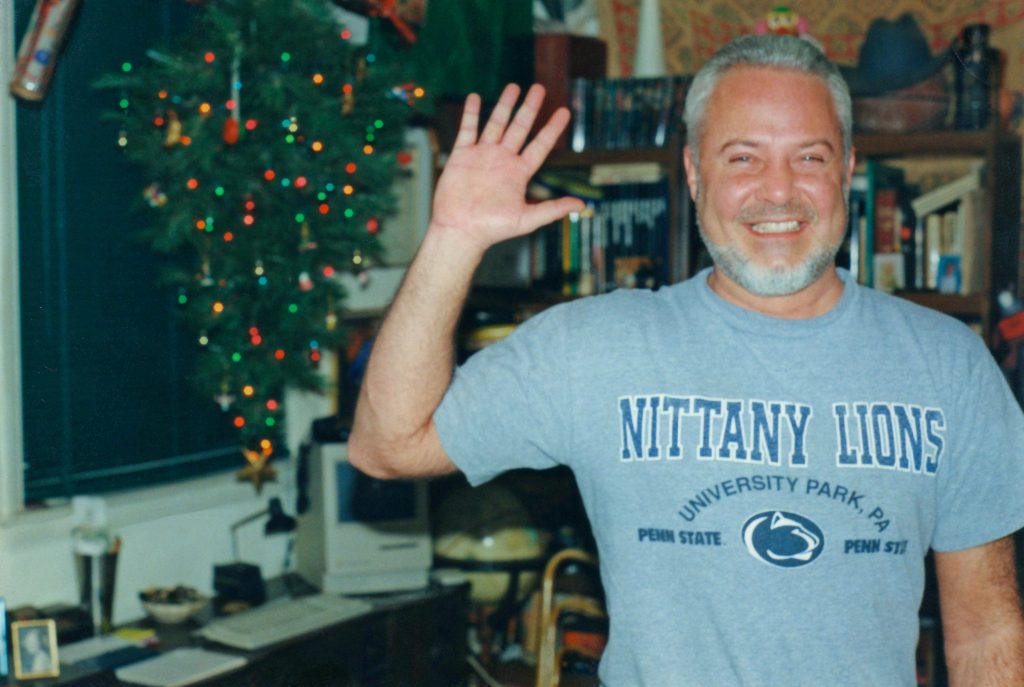
An Argument for ‘Xmas’ as a Secular Holiday
I’ve always thought these other holidays like HumanLight and Festivus were kind of lame attempts to compete with Christmas. After all, Christmas has a lot of cultural evolution behind it that has caused it to succeed very well.
Everyone should know that Christians have appropriated many older customs to form this holiday to try and make it their own. I don’t see why we can’t appropriate it for ourselves just as they did. It is already well on the way to becoming a “secular” holiday anyway, so maybe we can just push it the rest of the way.
There are many Christians who don’t understand the history of why it is sometimes abbreviated as “Xmas,” and they object to that abbreviation because they think it is “Xing out Christ from Christmas.”
Rather than trying to continually enlighten them about this issue, why not embrace their misunderstanding? We can say, “Yes! that’s exactly what we are trying to do!!! We are going to celebrate Xmas just like you celebrate Christmas, but without the Jesus BS.” We can still have the tree, the lights, and the gifts etc., but without a Jesus in the manger.
If Christians can steal it from pagan traditions, then we can steal it from them.
It could also be considered somewhat edgy, just like the X-Games relate to the Olympics. We could add our own extra flourishes to replace those that we are excluding (possibly crowning the tree with a Flying Spaghetti Monster rather than a star, for example).
I think it may be easier to appropriate it than to compete against it.
The ‘Rigged’ U.S. Election System
How many ways is the election system rigged in the U.S.?
First, there are various voter suppression tactics used by those in power. Wikipedia currently list examples including: impediments to voter registration, photo ID laws, purging of voter rolls, limitations on early voting, felon disenfranchisement, transgender disenfranchisement, disinformation about voting procedures, inequality in Election Day resources, closure of DMV offices, caging lists, gerrymandering, and off-year elections (Voter suppression in the United States). Other tactics can include changing polling locations, changing polling hours, reducing the number of polling places, and under-staffing and limiting the number of voting machines in select areas. There may be others I failed to cover here.
Second, the antiquated Electoral College system which allows the possibility that the winner or the popular vote could still lose the election. It also causes the votes of some to count more than the votes of others, and it causes parties and politicians to pander to and focus more on the concerns of some states over others.
Third, the two-party system has become so embedded that makes it almost impossible for third party candidates to have a realistic chance of winning, and the two major parties that have the power have an incentive to keep it that way. Independent or unaffiliated voters (which are currently 38 percent of the country vs. 32 percent Democrat and 23 percent Republican) may have difficulty finding candidates to represent them, and, depending on the state and party, they may or may not be allowed to vote in the Republican or Democratic primaries.
Fourth, there may be other issues with candidates going against those in the “establishment” within the respective parties. Possibly the most obvious example is the power of so-called “Super-Delegates” in the Democratic Party.
However, possibly the most significant way the election system is rigged is the influence of big money in politics….
Some time back, Larry Lessig presented a great TED Talk about ‘Lester Land’ and how we all live in it. The idea is basically that it’s the people with money who decide what our choices are. It costs quite a bit of money to run for office, and the higher the office the more it costs. Unless someone has money or wins the favor of those who do, they are less likely to get elected. So, our choices come pre-selected and only those candidates who are willing to support the interest of the ‘Lesters’ will come into power.
A 2014 study conducted by Princeton and Northwestern universities concluded that “In the United States, our findings indicate, the majority does not rule — at least not in the causal sense of actually determining policy outcomes. When a majority of citizens disagrees with economic elites and/or with organized interests, they generally lose. Moreover, because of the strong status quo bias built into the U.S. political system, even when fairly large majorities of Americans favor policy change, they generally do not get it.”
The study also said, “The central point that emerges from our research is that economic elites and organized groups representing business interests have substantial independent impacts on US government policy, while mass-based interest groups and average citizens have little or no independent influence” and “Americans do enjoy many features central to democratic governance, such as regular elections, freedom of speech and association and a widespread (if still contested) franchise. But we believe that if policymaking is dominated by powerful business organisations and a small number of affluent Americans, then America’s claims to being a democratic society are seriously threatened.”
The study found that the influence of the average American is at a “non-significant, near-zero level.”
I’ve seen many people reference George Carlin’s comments on the matter to explain why they don’t vote. Carlin argued that “The real owners are the big wealthy business interests that control things and make all the important decisions. Forget the politicians, they’re an irrelevancy. The politicians are put there to give you the idea that you have freedom of choice. You don’t. You have no choice. You have owners. They own you. They own everything. They own all the important land. They own and control the corporations. They’ve long since bought and paid for the Senate, the Congress, the statehouses, the city halls. They’ve got the judges in their back pockets. And they own all the big media companies, so that they control just about all of the news and information you hear. They’ve got you by the balls. They spend billions of dollars every year lobbying – lobbying to get what they want. Well, we know what they want; they want more for themselves and less for everybody else.”
Carlin argues that we only have the ‘illusion’ of choice. The Princeton and Northwestern study indicate this may be the case, that we really have an oligarchy posing as a democracy.
This is not inspiring, and it may largely explain why a great many Americans don’t bother to vote, why they might vote for a third party, or why they might be so frustrated they are willing to see it all burn down.
Unless we can begin to address the main issue concerning “economic elites and organized groups representing business interests” running the show, we aren’t going to be able to do much to address the other issues. Some Supreme Court cases will need to be overturned, or new laws or amendments need to be passed by Congress (which they will not be inclined to do). Larry Lessig has some suggestions, as do others like Cenk Uygur of the online TYT Network (see: Wolf PAC). Perhaps there are others….
However, until we can get big money out of politics, we aren’t going to have much control of anything.
Major Study Finds The US Is An Oligarchy
The US is not a democracy but an oligarchy, study concludes
Testing Theories of American Politics: Elites, Interest Groups, and Average Citizens
Ghosts & Gods
A ghost is supposedly “the soul or spirit of a dead person or animal that can appear to the living.” So, to believe in ghosts it would seem you would have to believe that living things have “souls” or “spirits.” “Souls” are defined as “the spiritual or immaterial part of a human being or animal, regarded as immortal,” and “spirit,” in this context, is defined as “the nonphysical part of a person that is the seat of emotions and character; the soul.”
If we are to accept evolution, at what point would there be any evolutionary pressure for a “soul” to evolve in ANY living thing? What would be the evolutionary advantage that would drive it?
Of course, it would seem that you would also have to believe in the supernatural to believe in “souls” (by any literal definition), and there isn’t any empirical evidence for anything supernatural. So, most people who believe in them seem to be theists who believe that everyone has an immortal soul that will somehow exist beyond death for eternity in some kind of afterlife. And many of them believe the “soul” enters the body at the point of conception, which is why many of them are supposedly opposed to abortion.
And it seems to be a point of contention among believers in the supernatural if other lifeforms have “souls” besides humans. It seems dogs (as one example) may be excluded from heaven according to the beliefs of some (because only humans are “special” enough to merit “souls”). And, of course, some argue that any potential human clones would not have “souls.”
The way a lot of theists seem to think about it is that the physical human is just some kind of an avatar for the actual person, who only truly exists as a “soul” (independent of the material world).
Consider the case of Charles Whitman. According to Wikipedia, “Charles Joseph Whitman (June 24, 1941 – August 1, 1966) was an American mass murderer who became infamous as the ‘Texas Tower Sniper’. On August 1, 1966, he murdered his mother and wife in their homes, then went to the University of Texas at Austin where he shot and killed three people inside the university’s tower. He then went to the tower’s 28th-floor observation deck, where he fired at random for some 96 minutes, killing an additional eleven people and wounding thirty-one before being shot and killed by police. Sixteen people were killed in total; a 17th victim died in 2001 from injuries sustained in the attack.”
The day before he committed the mass killing, he wrote:
“I do not quite understand what it is that compels me to type this letter. Perhaps it is to leave some vague reason for the actions I have recently performed. I do not really understand myself these days. I am supposed to be an average reasonable and intelligent young man. However, lately (I cannot recall when it started) I have been a victim of many unusual and irrational thoughts. These thoughts constantly recur, and it requires a tremendous mental effort to concentrate on useful and progressive tasks.”
According to Wikipedia, “In his note, he went on to request an autopsy be performed on his remains after he was dead to determine if there had been a discernible biological contributory cause for his actions and for his continuing and increasingly intense headaches.”
The autopsy found that he had a “pecan-sized” brain tumor. Texas Governor John Connally commissioned a task force to look into the matter. Psychiatric contributors to the report concluded that the “tumor conceivably could have contributed to his inability to control his emotions and actions.”
Assuming the brain tumor had something to do with Charles Whitman’s actions, was his “soul” sending commands to his human avatar that were being blocked by the tumor? Was his “soul” responsible for his actions, or had his “soul” lost control of his physical mind? If we presume the latter case, it would seem the “soul” only has limited control of its human avatar that can be overpowered by the physical/material world.
This is probably only one of the most dramatic examples of a multitude of recorded instances where people have been known to start acting and behaving differently as a result of damage to the brain (either from physical injury or from other reasons like tumors or dementia). Where would we even begin to consider the “soul” responsible vs. some physical element?
I think this calls into question the whole idea of a supernatural “soul” having any kind of control at all. If we believed that it did, we would either have to accept that it could easily be thwarted by physical/material happenstance, OR that the “emotions and character” of the “soul” happened to change–just by coincidence–at the same time that damage to the brain occurred.
There are many other things that might be unpacked here (like why are there so many reports of ghosts wearing clothes; or what enables them to float and pass through walls, but keeps them attached to the earth; or if all aborted fetuses go to heaven, what’s so bad about that, etc. but I’ll not go into all that here).
The main thing I want to keep focus on here is how a immaterial, supernatural “soul” can have ANY influence or communication with the physical person while the person is living.
The most interesting answer to this question seems to have been resolved when the Higgs Boson was discovered in 2012.
Cosmological physicists such as Sean Carroll and Brian Cox make the argument that the physics we currently know is sufficient to rule out the possibility of such things as ghosts. As Carroll says, “Within QFT [Quantum Field Theory], there can’t be a new collection of ‘spirit particles’ and ‘spirit forces’ that interact with our regular atoms, because we would have detected them in existing experiments.”
Sean Carroll explained it at the 2013 AHA conference.…
Brian Cox agrees…
If this is the case, then it would seem to also rule out any definition of a “spiritual/supernatural” god who could interact with the material world. In other words, this may be empirical evidence that “gods” (by any definition that matters to us) don’t exist.
Junk Mail

One way to cut down on some of the junk mail is to put a notice on your mailbox for your postal worker reading: “NO ADVO OR MARRIAGE MAIL PLEASE.”
A Divine Epiphany
 God just spoke to me….
God just spoke to me….
He was in the bathroom while I was shaving.
He said that he wouldn’t intervene (except in this one instance) to tell me what he thought, and he asked me to pass it along.
He told me personally that all your problems and moral concerns are not his, and that you have to work them out yourselves, using your own reason.
He said he doesn’t need to punish you or reward you, because you are well equipped to punish or reward yourselves.
He said, “Either you can work this out yourselves or you can’t. If you can’t, it is your own fault and you will suffer the consequences.”
“On the other hand,” he said, “you can reap the rewards of your own efforts, and take responsibility for your own life and meaning.”
He said, “I say this: live the life you have and make it the best you can. Do your best while you can. It is the only life you get.”
He also said, “Any god who needs state support is a false god. Any god who needs you to worship him is a false god. Any god that threatens eternal torment to anyone for anything is a false god.”
He said, “If some god wants to punish you in hell-fire for eternity, then fuck him and the donkey, ass, or horse–winged or otherwise–he rode in on.”
Then there was my epiphany moment….
Just as Abraham had his epiphany moment and concluded there was just one God, I had mine and realized that there were none.
The God I was seeing was my reflection in the mirror. The God I was hearing was me.
“Well, what did you expect?” he asked.